Contents
Content Type: 5
Title: CASLS Annual Staff Retreat
Body:
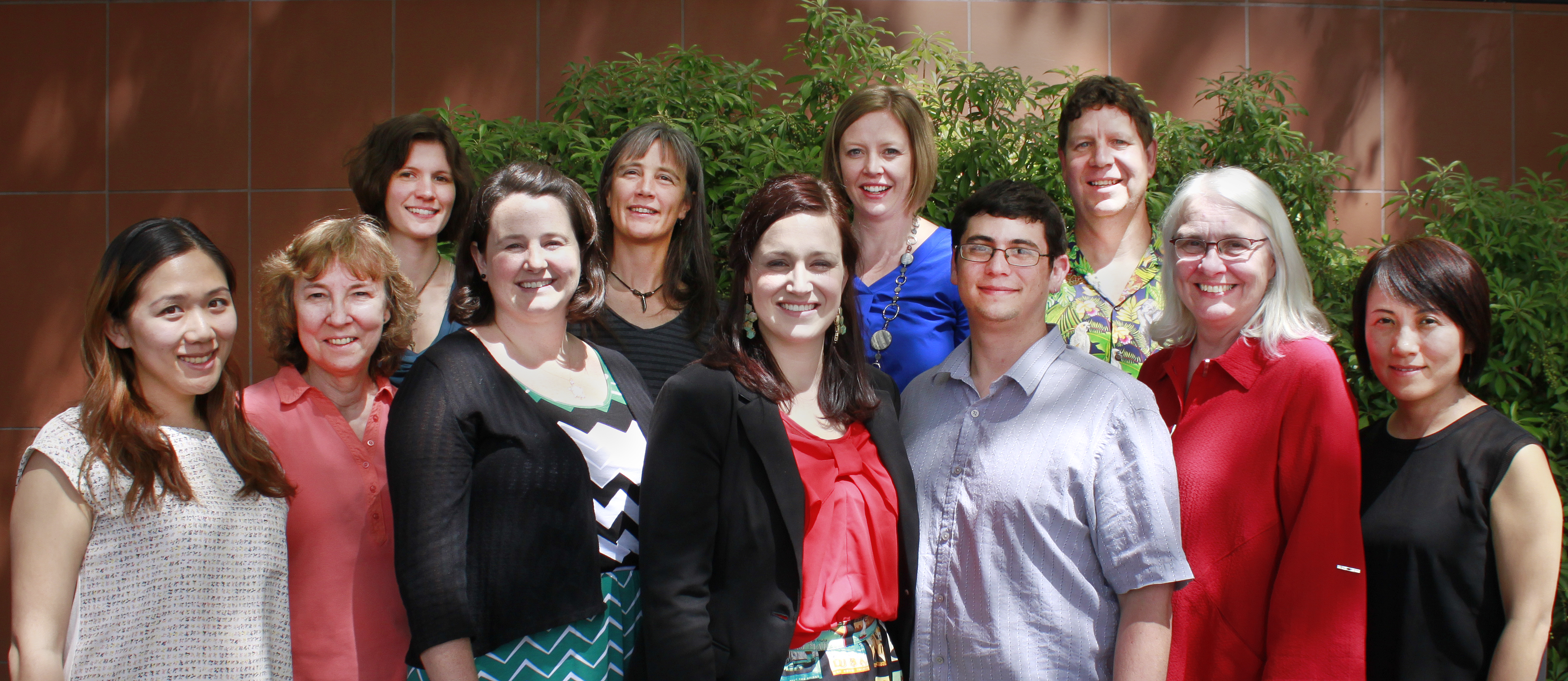
CASLS had their annual staff retreat on June 23. The retreat is a time for staff to set and check in on long term goals and planning for the center, as well as a chance to get to know each other better through team building activities. Mandy Gettler, CASLS Associate Director, said about the retreat: "The annual retreat is an opportunity to pause and reflect. Why are we here each day? How are the projects we're working on improve language education? Reaffirming our values and reconnecting with our mission helps each of us see the bigger picture and why our work matters. The retreat also allows us to draw connections between our values and our daily work. Without those connections, it's easy to feel drained and lose motivation."
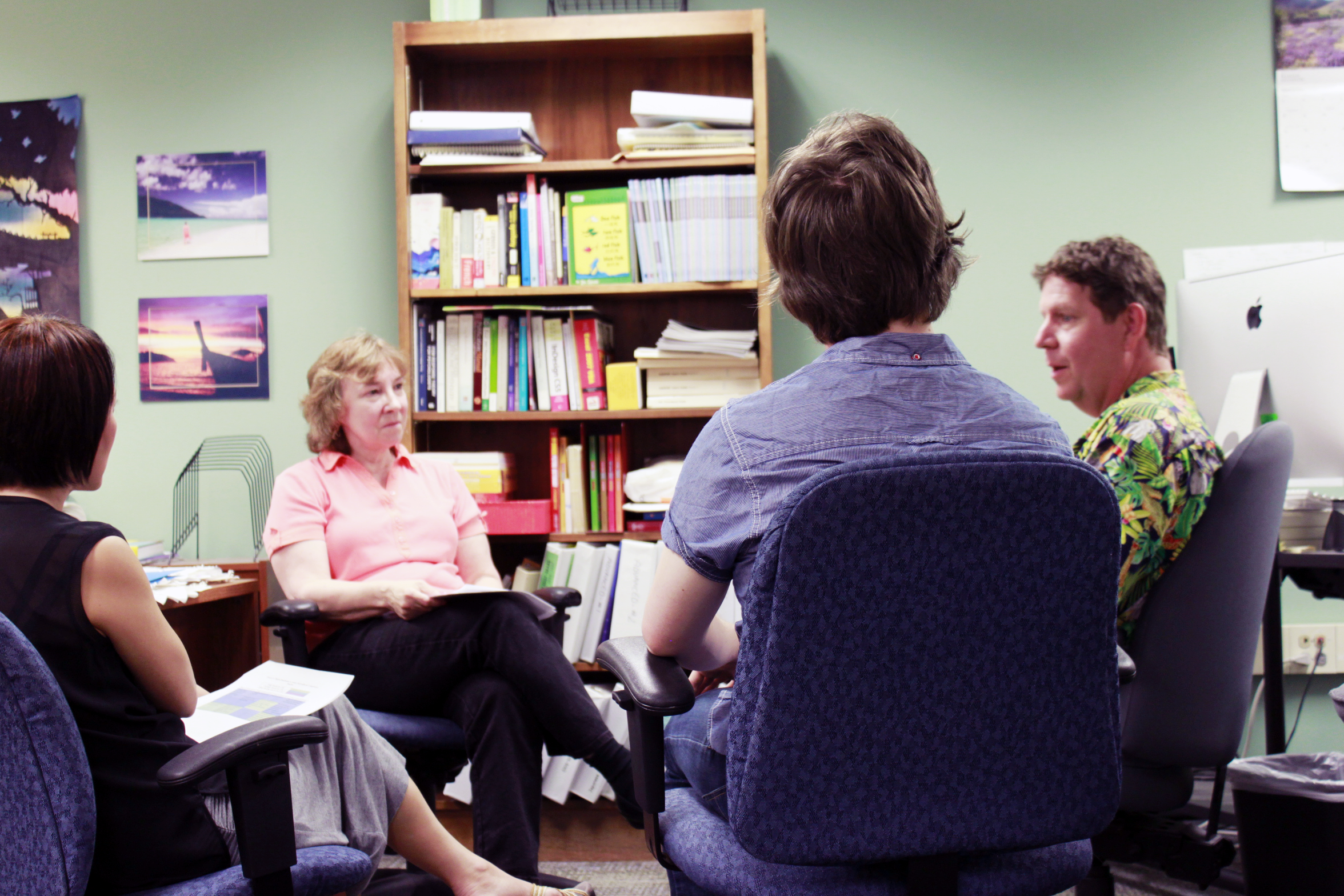
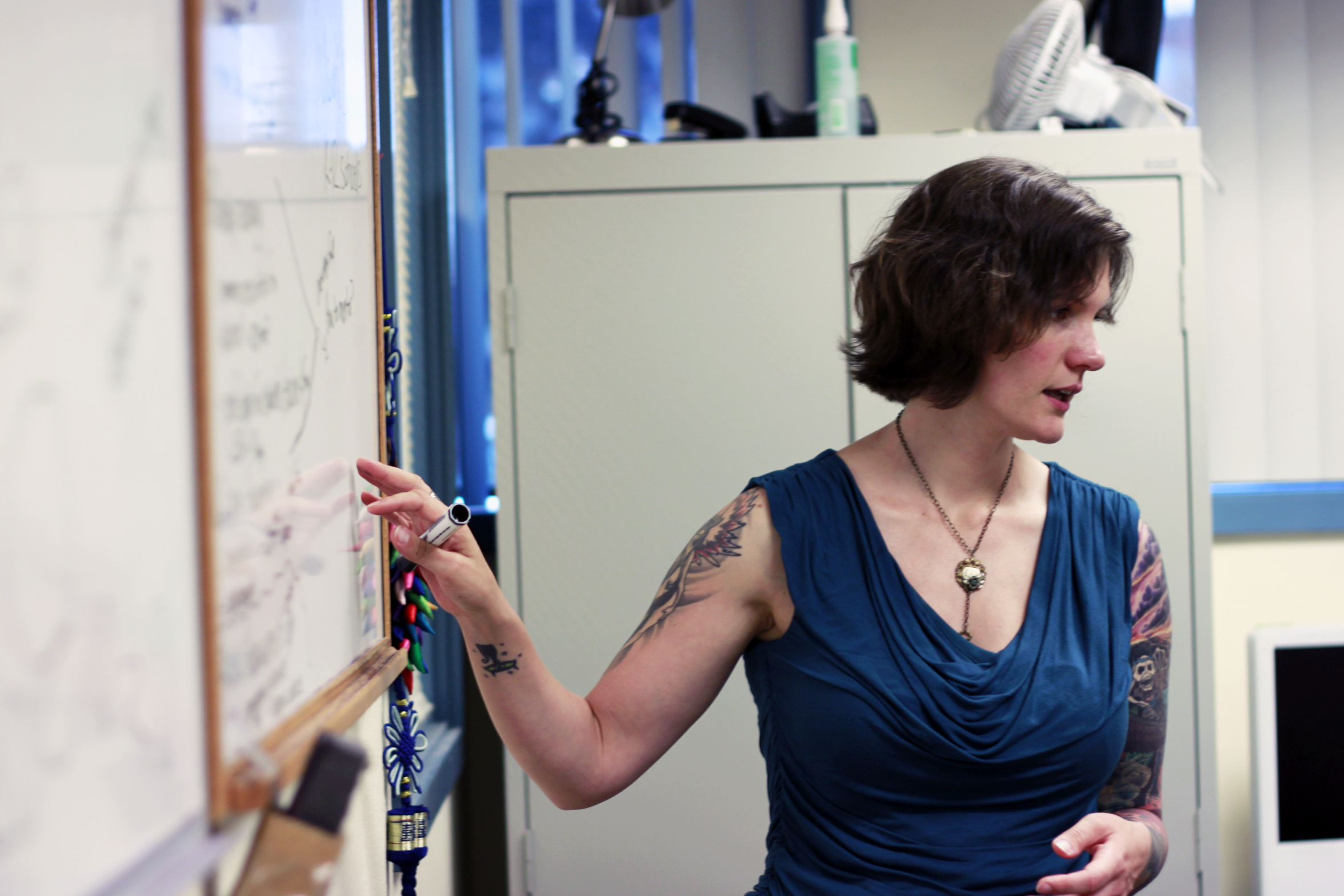
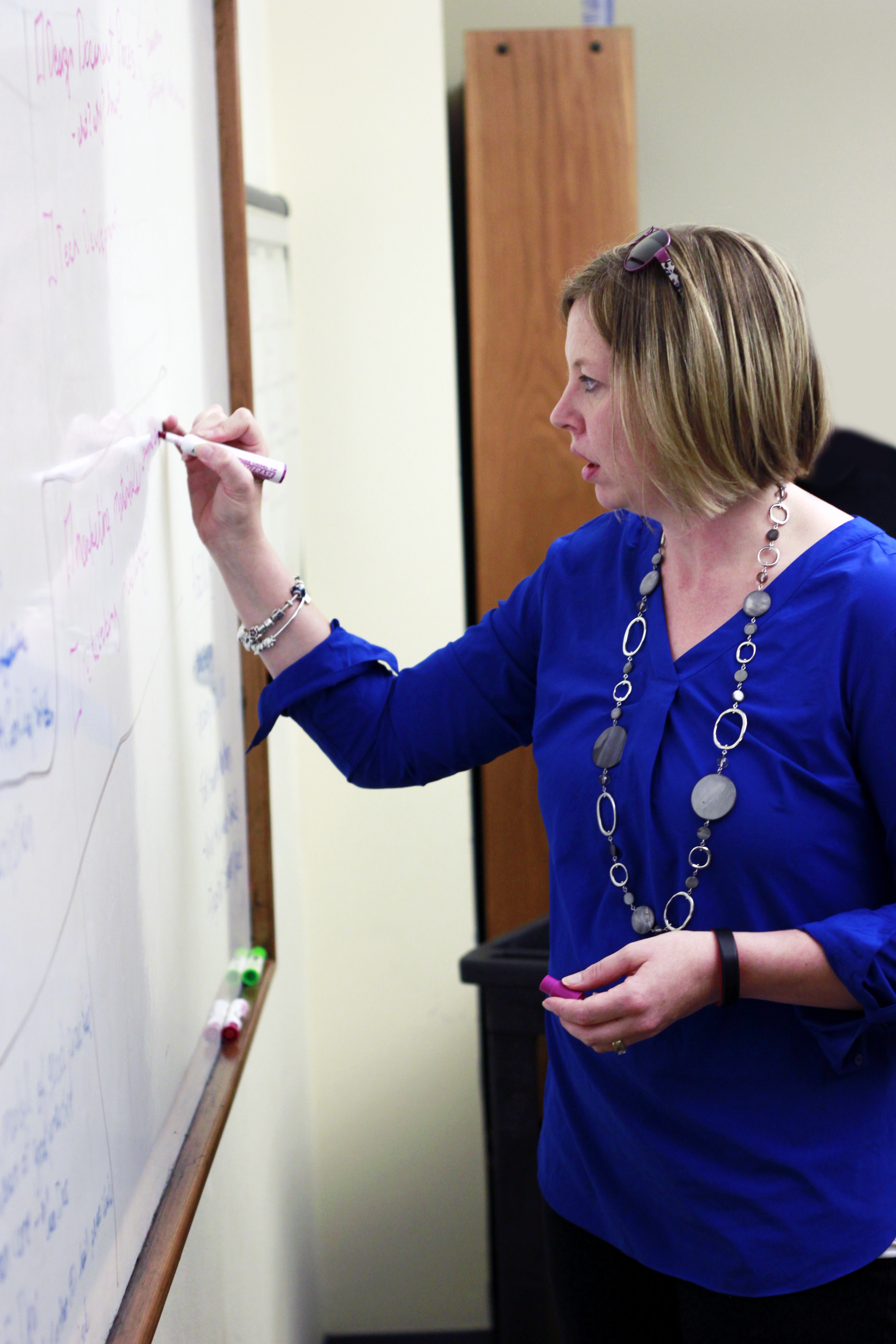
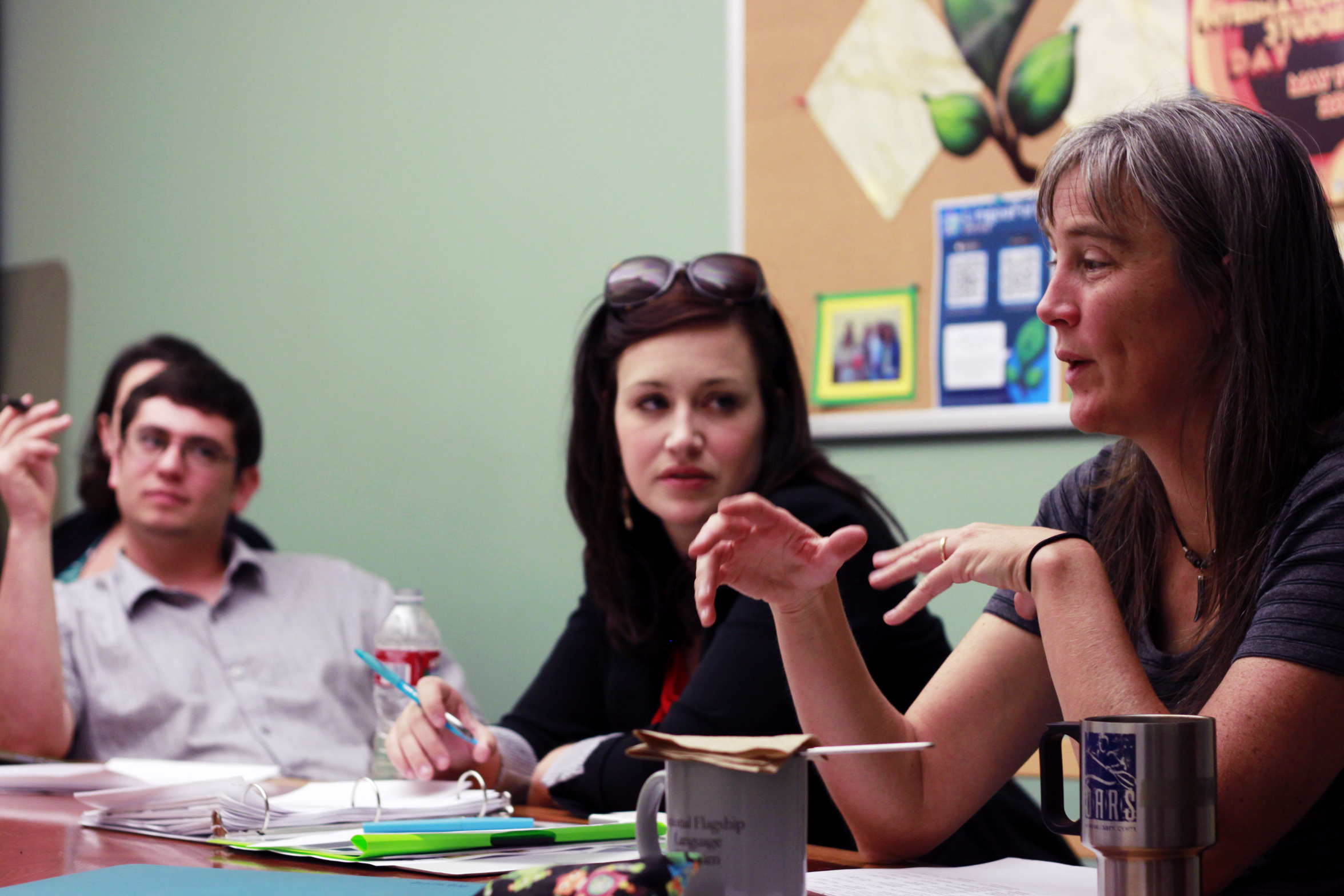
Source: CASLS Spotlight
Inputdate: 2015-06-25 16:13:53
Lastmodifieddate: 2015-06-29 03:17:00
Expdate:
Publishdate: 2015-06-29 02:15:01
Displaydate: 2015-06-29 00:00:00
Active: 1
Emailed: 1
Isarchived: 0
Content Type: 3
Title: What Language Classes Can Do for Heritage Learners’ Oral (and written) Skills
Body:
Dr Anna Mikhaylova is Assistant Professor of Linguistics at University of Oregon, specializing in Second and Heritage Language Acquisition and Bilingualism. She also serves as Associate Editor of Heritage Language Journal (http://www.heritagelanguages.org), an online peer-refereed publication devoted to the teaching and learning of heritage languages.
Both anecdotal accounts of teachers and parents and some research studies point to an asymmetry in heritage and foreign language learners’ language experience that translates to asymmetries in their strengths and weaknesses. This is non-surprising because Grosjean’s (2008) Complementarity Principle applies to both types of bilinguals: they use the target language for different purposes with different people and in different domains. That is, heritage speakers, who acquire the language from birth in the home environment and often gaining literacy later than age-matched monolingual speakers of the language, are often found to be better at speaking and listening than at reading and writing. In contrast, foreign language speakers are known to be less fluent in oral skills and stronger in the literacy-based skills precisely because their main exposure to the language is in an academic context.
With that asymmetry in mind, recent scholarship has been pointing to the inadequacy of some of the teaching and assessment approaches that have been designed and found effective for foreign language learners when applied to the heritage language learner. For example, Kagan and Friedman (2003) suggest that OPI is a more valid measure of oral proficiency if ACTFL guidelines are supplemented with knowledge of features of heritage languages, such as limited registers, code-switching and asymmetry between oral proficiency and literacy levels. Along those lines Montrul and colleagues (2008) show that tasks that require more explicit knowledge are less familiar and this more difficult for heritage speakers than oral tasks relying on implicit knowledge of the language (while the picture is reversed for foreign language learners).
At the same time the oral and overall proficiency of heritage speakers should not be overestimated. It is often assumed that heritage language learners are capable of accomplishing a full range of speaking tasks of different levels of difficulty. However, Kagan and Dillon (2008), Dubinina (2012) and Swender and colleagues (2014) show that while Russian heritage speakers control some registers, their discourse competence is limited by the range of social interactions in the family domain and they make a range of discourse errors, especially in more formal registers. Importantly, Kagan and Dillon (2008) suggest that even though the literacy skills of heritage learners when they enter language classes often are not developed beyond elementary levels, they are fast learners and can develop such skills fairly quickly. Also, research overviewed by Montrul (2012) shows that both heritage and foreign language learners benefit from instruction. All of this seems to point to the need to supply heritage language learners with the experience they are lacking, i.e. discourse competence that involves high-level skills in formal and academic registers. Importantly, it is crucial to provide them with experience and means of connecting what they are good at (listening and speaking) to the literacy-based skills.
The Activity of the Week by Marina Tsylina offers one such attempt, which proved successful in a Russian heritage language learner classroom.
References:
Dubinina, I. Y. (2012). How to Ask for a Favor: An Exploration of Speech Act Pragmatics in Heritage Russian (Doctoral dissertation, BRYN MAWR COLLEGE).
Grosjean, F. 2008. Studying Bilinguals. Oxford: Oxford University Press.
Kagan, O., & Friedman, D. (2003). Using the OPI to place heritage speakers of Russian. Foreign Language Annals, 36(4), 536-545.)
Kagan, O., & Dillon, K. (2008) Issues in Heritage Language Learning in the United States. In N. Van Deusen-Scholl & N. H. Hornberger (Eds.), Encyclopedia of Language and Education (2nd ed., Vol 4, pp. 143-156). New York: Springer Science+Business Media.
Montrul, S. (2012). Is the heritage language like a second language? EUROSLA Yearbook,12, 1-29.
Swender, E., Martin, C. L., Rivera‐Martinez, M., & Kagan, O. E. (2014). Exploring oral proficiency profiles of heritage speakers of Russian and Spanish. Foreign Language Annals, 47(3), 423-446.)
Source: CASLS Topic of the Week
Inputdate: 2015-06-26 08:39:27
Lastmodifieddate: 2015-06-29 11:54:07
Expdate:
Publishdate: 2015-06-29 02:15:01
Displaydate: 2015-06-29 00:00:00
Active: 1
Emailed: 1
Isarchived: 0
Content Type: 4
Title: Discourse Cohesion Activity
Body:
Marina Tsylina is MA candidate at the Russian East European and Eurasian Studies Center at the University of Oregon. The activity was developed during her year teaching Russian heritage speakers at Portland State University.
This activity is related to the points brought up by Dr Mikhaylova in the Topic of the Week.
This activity aims at developing narrative oral and writing skills among heritage language learners. After completing this activity, students will solidify their abilities to narrate a story, using linking elements. This activity was used in a heritage language class, but it will also work for a mixed/foreign Russian language class. This activity simultaneously engages several skills: reading, listening and speaking.
Mode(s): Presentational Writing, Presentational Speaking, Interpretive Reading, Interpretive Listening
Objectives:
- Students will be able to understand and analyze the difference between two narratives: one with the means of cohesion, the other one without them.
- Students will become familiar with the means of cohesion and will be able to recognize them in the text.
- Students will be able to make up their own stories with the linking words, which will add evenness to their narratives.
- Students will be able to develop their writing and oral narrative skills.
Resources: Discourse Cohesion Activity Handout and Strip Story Handout in Russian.
*For an English example of a similar type of activity, see Cohesion in Writing Handout created by Renee Marshall, CASLS curriculum consultant.
Procedure:
- Students are given two similar narratives; the only difference between them is the absence of linking phrases in one of them. Their task is to read the narratives and to understand that one of the versions is not very smooth and the other sounds better, as it contains linking words.
- The next step is to introduce students to a range of linking words, which can be used in a narrative.
- Then, students are asked to retell the story in their own way, using the means of text cohesion.
- Next, students are asked to make up similar stories, on the basis of the texts they read, using the linking words.
Next time, to solidify students’ knowledge of linking words, they can be asked to fulfill the task of reassembling the parts of the story together. The activity is called “Strip story.” The whole story is divided into ten or more (depending on the number of students) pieces. The students are not allowed to show their strips to each other. They are allowed to read them to each other and to place them in the right order to get a story. Cohesive devices are missing in the story so that they need to be supplied by students.
Source: CASLS Activity of the Week
Inputdate: 2015-06-26 09:39:40
Lastmodifieddate: 2015-06-29 03:17:00
Expdate:
Publishdate: 2015-06-29 02:15:01
Displaydate: 2015-06-29 00:00:00
Active: 1
Emailed: 1
Isarchived: 0
Content Type: 1
Title: Book: L2 Pragmatic Development in Study Abroad Contexts
Body:
From: http://peterlang.com/index.cfm
L2 Pragmatic Development in Study Abroad Contexts
By Rei Wen
Published by Peter Lang International Academic Publishers
Pragmatic competence plays a key role in intercultural communication, particularly for students studying in a target community. This book investigates the effect of study abroad on second language learners’ productive and receptive pragmatic competences, as well as their cognitive processes during speech act production. It employs a variety of research instruments, both quantitative and qualitative, to explore learners’ pragmatic development over one year. The inclusion of a control group is a methodological strength of the longitudinal study, many such studies often not including a control group. In addition, the study longitudinally examines learners’ cognitive processes during study abroad with innovative and insightful analyses. The book makes an important contribution to second language pragmatics with regard to developmental changes in both speech act production and perception during such processes.
Visit the publisher’s website at http://peterlang.com/index.cfm?event=cmp.ccc.seitenstruktur.detailseiten&seitentyp=produkt&pk=78799&concordeid=431358
Source: Peter Lang International Academic Publishers
Inputdate: 2015-06-27 15:27:28
Lastmodifieddate: 2015-06-29 03:17:00
Expdate:
Publishdate: 2015-06-29 02:15:01
Displaydate: 2015-06-29 00:00:00
Active: 1
Emailed: 1
Isarchived: 0
Content Type: 1
Title: Book: Developing Interactional Competence in a Japanese Study Abroad Context
Body:
From http://www.multilingual-matters.com/display.asp?isb=9781783093717
Developing Interactional Competence in a Japanese Study Abroad Context
By Naoko Taguchi
Published by Multilingual Matters
In the process of second language acquisition, the ability to interact effectively is critical. But what does it mean to be interactively competent? This book addresses this question by presenting research on the development of interactional competence among learners of Japanese as a second language. Qualitative data collected on learners studying abroad in Japan is evaluated to explain changes in their interactional competence and provides specific insights into the learning of Japanese. The situated analysis of multiple data sets generates meaningful interpretations of the development of interactional competence and the learner-specific factors that shape developmental trajectories. Moreover, the context of the research provides insights into the types of learning resources and experiences that study abroad provides to assist learners in their progress towards becoming a competent speaker in the target community.
Visit the publisher’s website at http://www.multilingual-matters.com/display.asp?isb=9781783093717
Source: Multilingual Matters
Inputdate: 2015-06-27 15:28:28
Lastmodifieddate: 2015-06-29 03:17:00
Expdate:
Publishdate: 2015-06-29 02:15:01
Displaydate: 2015-06-29 00:00:00
Active: 1
Emailed: 1
Isarchived: 0
Content Type: 1
Title: Book: Vistas of English for Specific Purposes
Body:
From: http://www.cambridgescholars.com/vistas-of-english-for-specific-purposes
Vistas of English for Specific Purposes
Edited by Nadežda Stojković
Published by Cambridge Scholars Publishing
English for Specific Purposes (ESP) is one of the most needed forms of English Language Teaching with regards to the adult population in today’s global market economy where the English language is a prerequisite for the exchange and communication of professional ideas, best practices, and experiences, and a necessary skill for advancement in one’s career. This comprehensive volume brings together the most insightful papers from the First International Conference on Teaching English for Specific and Academic Purposes, titled “Connect and Share”, held at the Faculty of Electronic Engineering of the University of Niš, Serbia, in May 2013. The collection covers a diverse and extensive list of topics, and provides a number of invaluable contributions which prove the presence of ESP in all continents, and in many different professions, sciences, and businesses. Also of interest is the fact these papers highlight the interrelatedness of ESP and linguistics, the methodology of teaching, sociolinguistics, and a number of other fields relevant to the study and practice of languages. The chapters of this book prove that immense, original, creative and worthwhile research is being conducted in the ever-growing and increasingly relevant field of ESP. At the same time, the book also offers rich insights into many innovative teaching practices that justify ESP as an important area of academic study.
Visit the publisher’s website at http://www.cambridgescholars.com/vistas-of-english-for-specific-purposes
Source: Cambridge Scholars Publishing
Inputdate: 2015-06-27 15:29:24
Lastmodifieddate: 2015-06-29 03:17:00
Expdate:
Publishdate: 2015-06-29 02:15:01
Displaydate: 2015-06-29 00:00:00
Active: 1
Emailed: 1
Isarchived: 0
Content Type: 1
Title: Call: CATESOL 2015: Technology Through the Ages
Body:
From: http://catesol.org/annualconference/
CATESOL 2015: Technology Through the Ages
Anaheim, California
November 12-15, 2015
Call deadline: June 30, 2015
Exhibitor deadline: July 22, 2015
For more information visit http://catesol.org/annualconference/
Source: CATESOL
Inputdate: 2015-06-27 15:31:35
Lastmodifieddate: 2015-06-29 03:17:00
Expdate: 2015-07-22 00:00:00
Publishdate: 2015-06-29 02:15:01
Displaydate: 2015-06-29 00:00:00
Active: 1
Emailed: 1
Isarchived: 0
Content Type: 1
Title: Call: MITESOL 2015 Conference
Body:
From: http://www.mitesol.org/MITESOL2015
Assessing Our Students, Our Programs, Ourselves: How Do We Measure Up?
October 9-10
Michigan State University
Kellogg Center, East Lansing
Call deadline: July 1st, 2015
MITESOL invites professionals involved with English language learners to submit proposals for our annual conference. The theme of this year’s conference, “Assessing Our Students, Our Programs, Ourselves: How Do We Measure Up?” is motivated by the increasing call for accountability in all areas of our profession.
To learn more visit http://www.mitesol.org/MITESOL2015
Source: MITESOL
Inputdate: 2015-06-27 15:33:37
Lastmodifieddate: 2015-06-29 03:17:00
Expdate: 2015-07-01 00:00:00
Publishdate: 2015-06-29 02:15:01
Displaydate: 2015-06-29 00:00:00
Active: 1
Emailed: 1
Isarchived: 0
Content Type: 1
Title: Call: 2015 MD-TESOL Conference
Body:
From: https://www.mdtesol.org/Conferences/2015-MD-TESOL-Conference
35th Maryland TESOL Annual Fall Conference
Beyond Borders: Connecting Diverse Perspectives
Date: Saturday, October 17, 2015
Location: Washington College
Proposal submission deadline: August 17th, 2015
For more information visit https://www.mdtesol.org/Conferences/2015-MD-TESOL-Conference
Source: MDTESOL
Inputdate: 2015-06-27 15:37:05
Lastmodifieddate: 2015-06-29 03:17:00
Expdate: 2015-08-17 00:00:00
Publishdate: 2015-06-29 02:15:01
Displaydate: 2015-06-29 00:00:00
Active: 1
Emailed: 1
Isarchived: 0
Content Type: 1
Title: 12th ANNUAL ALAS EDUCATION SUMMIT
Body:
From: http://www.alasedu.org/
Join ALAS for the 12th Annual ALAS Education Summit in Albuquerque, New Mexico, October 14-17, 2015.
ALAS is a professional organization for superintendents and administrators who serve Latino students. ALAS is committed to identifying, recruiting, developing and advancing Latino school administrators in order to improve the educational accomplishments of Latino youth.
ALAS has 3 primary areas of focus:
- Professional Development - Professional development programs that strengthen the skills of superintendents, principals, and other administrators.
- Information Sharing - Information sharing around innovative instructional and learning strategies that have proven successful in motivating Latino youth and increasing academic performance in critical learning areas.
- Policy Advocacy - Policy advocacy to ensure high standards and quality in our public education system.
To register for the conference visit http://www.alasedu.org/
Source: ALAS
Inputdate: 2015-06-27 15:38:53
Lastmodifieddate: 2015-06-29 03:17:00
Expdate: 2015-10-18 00:00:00
Publishdate: 2015-06-29 02:15:01
Displaydate: 2015-06-29 00:00:00
Active: 1
Emailed: 1
Isarchived: 0
